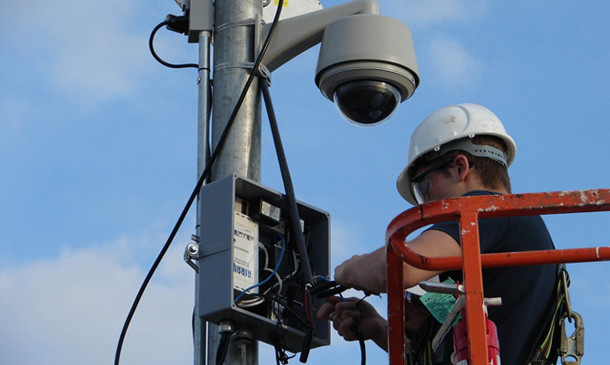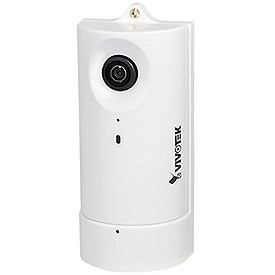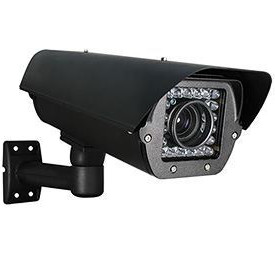
Advancements in video surveillance technology have given retailers and commercial facility managers greater control over security than ever before. With that added control, though, comes a huge range of options and features to consider when choosing security cameras. To make the process a little less overwhelming, we’ve compiled a list of important questions you can ask yourself before updating your commercial or retail security system.
IP or Analog?
Today’s security cameras can be divided into two main categories: internet protocol (IP) and analog.
Analog
For decades analog was the standard in video surveillance, producing standard definition footage without any bells and whistles. Analog systems were designed with CCTV technology, since they needed to conform to traditional broadcast television standards.
IP
Things changed in 1996 with the introduction of the first network camera, otherwise known as an IP camera. In addition to offering a sharper picture than analog, IP security cameras opened up a world of possibilities through communication with computer networks, digital alarm systems, video analytics software, lighting and more.
The biggest upside here is that it provides a smarter surveillance process
Video analytics in particular have made IP cameras a popular addition to retail and commercial security systems. Some of the more innovative features include motion and tampering detection, which send automatic alerts via email to notify users about potential security risks. The biggest upside here is that it provides a smarter surveillance process, since you don’t have to monitor the system manually.
These cameras also help reduce cable clutter by connecting wirelessly to a network video recorder (NVR). You’ve got a lot of flexibility in where you place the NVR, as long as it’s connected to the same LAN as the cameras. As an added benefit, some enterprise-class NVRs can hold more than 100 channels.
Analog cameras, meanwhile, require a direct connection to a digital video recorder (DVR), which stores video on the device itself after converting the signal to digital. Hybrid DVRs can support both analog and IP security cameras, providing added flexibility for your system.
To recap:
IP cameras
- Higher resolution (up to 1080p)
- Typically affords a wider range of view, which means fewer cameras are required to cover the same area
- Allows for communication with computer network and third-party video analytic software, digital alarm systems, lighting, etc.
- Higher initial investment but this can pay off when purchasing larger systems
- Can be integrated with either a hybrid DVR or NVR
Analog cameras
- Lower resolution (up to 720p)
- Lower upfront cost
- Uses CCTV technology connecting with coax cable
- Can be integrated only with DVR, which converts the analog signal to digital
Indoor or Outdoor?
Different sites naturally raise different challenges for surveillance—everything from lighting and visibility to weather and vandalism. Although it’s probably clear which areas need an indoor camera and which areas need an outdoor camera, there are some significant variations within each category.
What complicates it further is that not all security cameras are clearly defined and labelled according to their purpose. Some can even be used inside or outside.
Indoor
Due to the relatively predictable and well-protected conditions of interior environments, indoor cameras are usually smaller and lighter than outdoor models. Both styles can offer useful features such as motion detection alerts and infrared technology for night vision, so you can get reliable video 24 hours a day.

The Vivotek CC8130 was designed specifically for indoor environments. Its compact cube design fits seamlessly into the environment while providing full video security without dead angles.
The right indoor camera will depend on the specific conditions and requirements of your site. For example if you’re looking for something discreet, consider a camera that is compact and unobtrusive. You may also want to boost surveillance by capturing sound, which only certain types of indoor security cameras offer.
Outdoor
As you might expect, outdoor security cameras have to endure some pretty harsh conditions, all while capturing reliable video. Their hardware is responsible for protecting high-tech features from wind, rain, snow, vandals and extreme temperatures, among other threats.
One of the details to look for when shopping for an outdoor security camera is the IP rating (not to be confused with an IP camera). In this case IP stands for ingress protection, which refers to the level of a product’s seal against things like moisture and dust. IP 68 is the highest possible score in this category, meaning that the enclosure is dust tight and protected against complete, continuous submersion in water.
Another helpful feature of an outdoor camera is infrared technology. By detecting certain wavelengths invisible to the human eye it can continue to perform reliable surveillance even in foggy conditions or near total darkness. An auto-iris lens will also help the camera adapt quickly to changing light conditions, ideal for outdoors.
Some outdoor security cameras come with optional features such as a heater and fan to maintain performance even during extremely cold or hot weather.
Also consider the site you’re trying to monitor and what kind of details are important to you. If it’s a parking lot, for example, you’ll want a camera with a high enough resolution to capture faces and license plate numbers. In fact, some outdoor security cameras are specifically designed with this purpose in mind. They can capture clear license-plate images in complete darkness, even if the vehicle is moving.

The Galaxy SED-CAM uses high-contrast imaging to deliver sharp license-plate captures, even at 110 mph.
To summarize the key distinctions:
Indoor cameras
- Usually smaller and less bulky
- Available in discreet designs that are ideal for boutiques and convenience stores
- Can also capture sound to enhance surveillance
Outdoor cameras
- More robust and durable housing to protect interior components in all conditions
- Available with added protective features like heaters and fans for extreme conditions, vandal protection and tamper detection
- Also available with infrared technology for clear picture even in darkness
Other questions to think about
Due to the wide range of options and features available today, finding the right cameras for your commercial or retail security system can take more research than ever before. But it doesn’t have to be complicated.
Here are a few more questions you can raise with a professional to zero in on the right product:
- Do you need the ability to check video remotely, such as with a smartphone?
- Do you need added security features such as encryption?
- Does your camera need to be hidden, or should it be visible to deter break-ins?
- Do you need to record sound as well as video?
- Do you have a power source nearby?
- Do you require 24/7 recording?
- Do you need compression technology and bandwidth efficiency for friendlier storage?
- Do you require a full 360-degree view?
- Does your camera need to pan, tilt and zoom, or can it remain static?
- What kind of details do you need capture?
At ABC we’re happy to help you find the perfect video surveillance solution to protect your assets and minimize loss exposure. We carry a wide selection of advanced products from leading manufactures including analog and IP cameras, and NVRs, DVRS and hybrid DVRs.
Contact us today for product information or to set up an onsite evaluation.


 blog
blog